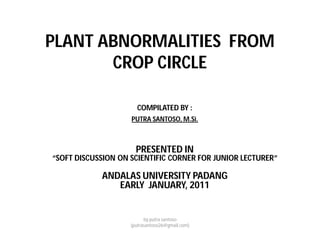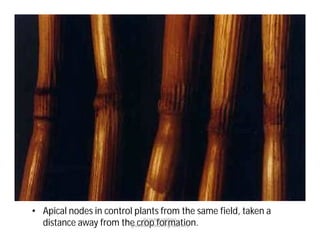ABNORMALITAS TUMBUHAN DARI CROP CIRCLE
- 1. PLANT ABNORMALITIES FROM CROP CIRCLE COMPILATED BY : PUTRA SANTOSO, M.Si. PRESENTED IN ŌĆ£SOFT DISCUSSION ON SCIENTIFIC CORNER FOR JUNIOR LECTURERŌĆØ ANDALAS UNIVERSITY PADANG EARLY JANUARY, 2011 by putra santoso (putrasantoso26@gmail.com)
- 6. Sample plants with apical node elongation and extreme bending, in wheat from a Maryland, USA crop formation.by putra santoso (putrasantoso26@gmail.com)
- 7. ŌĆó Apical nodes in control plants from the same field, taken a distance away from the crop formation.by putra santoso (putrasantoso26@gmail.com)
- 8. Four plants on left (from an Italian crop circle) show apical node elongation & slight bending. Two apical nodes on right are from controls.by putra santoso (putrasantoso26@gmail.com)
- 9. NODE BENDING, which may (depending on the age of the crop when formation occurred & time elapsed since then) or may not be indicative of the genuine phenomenon.by putra santoso (putrasantoso26@gmail.com)
- 10. Marked bending at the base of conola/oilseed rape plants -- which are known to break, not bend, when mechanically flattened. Photos: Janet Ossebaardby putra santoso (putrasantoso26@gmail.com)
- 11. Expulsion cavity typical of those often found in crop circle samples, but very rarely seen in control plants examined by W.C. Levengood. However, the data indicates this abnormality is not present in all "genuine" formations.by putra santoso (putrasantoso26@gmail.com)
- 12. Expulsion cavity in corn (maize). Thought to result from intense, very brief bursts of microwaves which instantly turn the moisture inside the plant stem nodes to steam.by putra santoso (putrasantoso26@gmail.com)
- 13. Expulsion cavities in older, mature plants can also look like this example, in mature wheat.by putra santoso (putrasantoso26@gmail.com)
- 14. Expulsion cavities in older, mature barley plants.by putra santoso (putrasantoso26@gmail.com)
- 15. SEED-HEADS, WHEAT Crop circle seed-head (right) has no seeds, due to destruction of plant's reproductive capacity. Found only when crop circles occur in very immature plants. by putra santoso (putrasantoso26@gmail.com)
- 16. STUNTED & DEHYDRATED MAIZE SEEDS (on right). These occur when embryos are already formed, or partially formed, when crop circle occurs. by putra santoso (putrasantoso26@gmail.com)
- 17. CONTROL MAIZE SEEDLINGS AT 7 DAYS FORMATION MAIZE SEEDLINGS AT 7 DAYS Showing reduced seedling growth-rate, which typically occurs if crop circles form in plants which are at an intermediate growth-stage. by putra santoso (putrasantoso26@gmail.com)
- 18. CONTROL MAIZE SEEDLINGS AT 7 DAYS FORMATION MAIZE SEEDLINGS AT 7 DAYS Showing reduced seedling growth-rate, which typically occurs if crop circles form in plants which are at an intermediate growth-stage. by putra santoso (putrasantoso26@gmail.com)
- 19. CONTROL SEEDLINGS, 12-DAY WHEAT Showing normal variation of growth-rate (height) for this particular species at this stage of development. by putra santoso (putrasantoso26@gmail.com)
- 20. FORMATION SEEDLINGS, 12-DAY WHEAT Showing induced synchronization of growth.by putra santoso (putrasantoso26@gmail.com)
- 21. INCREASED GROWTH-RATE OF FORMATION SEEDLINGS (as opposed to controls), in seeds from crop which was mature when crop circle formed. by putra santoso (putrasantoso26@gmail.com)





















